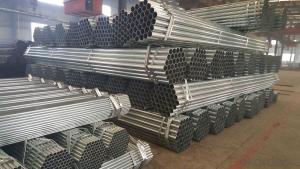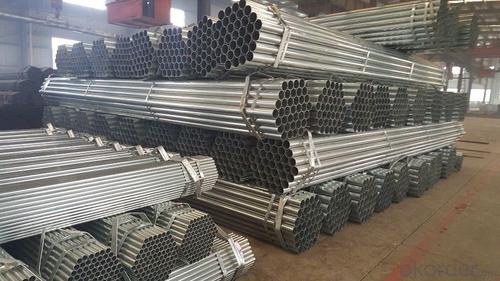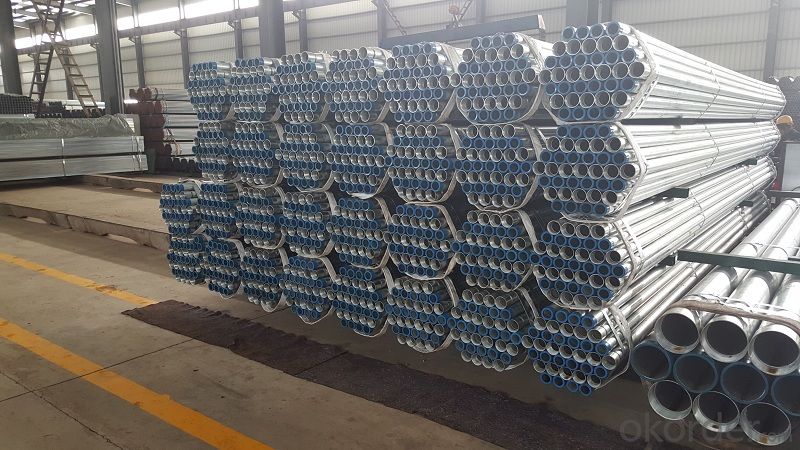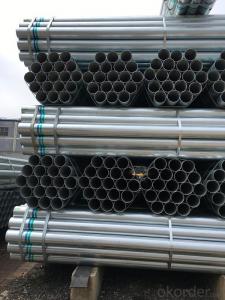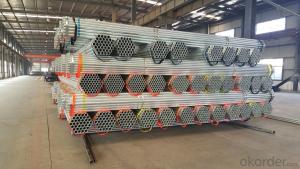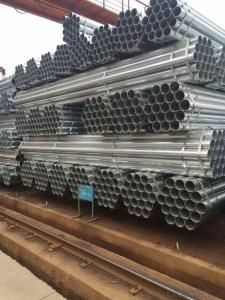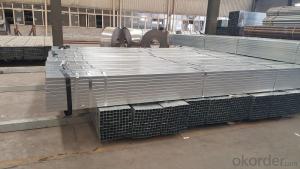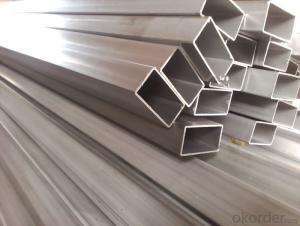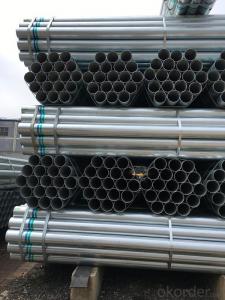Galvanized welded steel pipe for building
- Loading Port:
- Shanghai
- Payment Terms:
- TT OR LC
- Min Order Qty:
- 30 m.t.
- Supply Capability:
- 12000 m.t./month
OKorder Service Pledge
OKorder Financial Service
You Might Also Like
Specification
1、Structure of Galvanized welded steel pipe for building :
The surface of galvanized steel pipe welded steel pipe of hot dip galvanized layer or. Galvanized can increase the corrosion resistance of the steel tube, prolong service life. Galvanized pipe is widely used, in addition to water, gas, oil and other general low pressure fluid pipelines. It is also used in the petroleum industry, especially for offshore oil field of oil well pipe and oil pipe, chemical, coking equipment of oil heater, condensation cooler, coal run oil exchanger tube, and trestle pile, the mine tunnel support frame tube.
2、Main Features of Galvanized welded steel pipe for building :
• High manufacturing accuracy
• High strength
• Good visual effect
• Reasonable price
3、 Galvanized welded steel pipe for building Specification:
Standard | GB, DIN, ASTM ASTM A106-2006, ASTM A53-2007 |
Grade | 10#-45#, 16Mn 10#, 20#, 45#, 16Mn |
Thickness | 1 - 33 mm |
Section Shape | Round |
Outer Diameter | 21 - 610mm |
Place of Origin | Tianjin, China (Mainland) |
Secondary Or Not | Non-secondary |
Application | Hydraulic Pipe |
Technique | Cold Drawn |
Certification | API |
Surface Treatment | factory state or painted black |
Special Pipe | API Pipe |
Alloy Or Not | Non-alloy |
Length | 5-12M |
Outer Diameter | 21.3-610mm |
Grade | 20#, 45#, Q345, API J55, API K55, API L80, API N80, API P110, A53B |
Standard | ASME, ASTM |
1) Material:Q195 Q235 Q345 X42 X52
2) Specification range:OD:21.3-610mm,WT:6-70mm,length:6-12m or according to the requirement of clients.
3) Excutive standards:GB,ASME API5L.ASTM A 106/A53,Despite of the above standards,we can also supply seamless steel pipe with standard of DIN,JIS,and so on,and also develop new products according to the requirements of our clients!
4) Surface: galvanized.
5) Ends:Beveled or square cut,plastic capped,painted.
6) Packing:bundles wrapped with strong steel strip,seaworthy packing.
4、Packaging & Delivery
Packaging Details: | seaworthy package,bundles wrapped with strong steel strip |
Delivery Detail: | 15-30days after received 30%TT |
5、FAQ of Galvanized welded steel pipe for building :
①How is the quality of your products?
Our products are manufactured strictly according to national and internaional standard, and we take a test
on every pipe before delivered out. If you want see our quality certifications and all kinds of testing report, please just ask us for it.
Guaranteed: If products’ quality don’t accord to discription as we give or the promise before you place order, we promise 100% refund.
②How about price?
Yes, we are factory and be able to give you lowest price below market one, and we have a policy that “ for saving time and absolutely honest business attitude, we quote as lowest as possible for any customer, and discount can be given according to quantity”,if you like bargain and factory price is not low enough as you think, just don’t waste your time.Please trust the quotation we would give you, it is professional one.
③Why should you chose us?
Chose happens because of quality, then price, We can give you both.Additionally, we can also offer professional products inquiry, products knowledge train(for agents), smooth goods delivery, exellent customer solution proposals.Our service formula: good quality+good price+good service=customer’s trust
SGS test is available, customer inspection before shipping is welcome, third party inspection is no problem.
6、 Galvanized welded steel pipe for building Images:
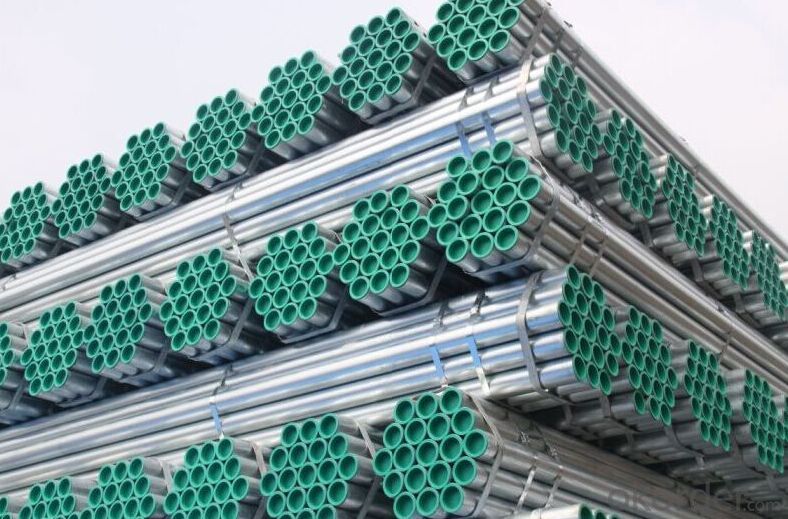
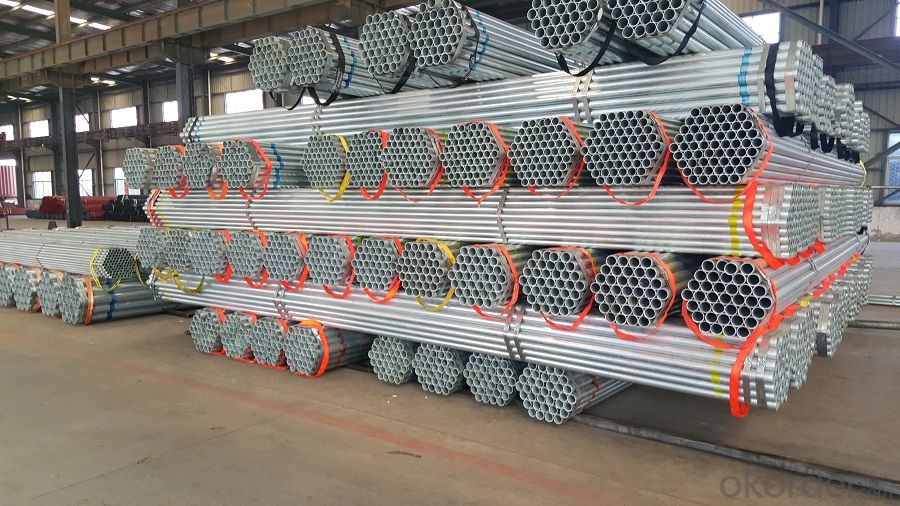
- Q: What are the factors to consider when designing a steel pipe system?
- When designing a steel pipe system, several factors need to be considered. Firstly, the intended purpose of the system and the materials that will be transported through it are crucial. This determines the required pipe diameter, thickness, and material type to ensure compatibility and prevent corrosion or leakage. Secondly, the operating conditions, such as temperature, pressure, and flow rate, must be examined to select pipes with suitable strength and resistance properties. Additionally, factors like environmental conditions, including soil characteristics and exposure to chemicals or natural elements, should be evaluated to determine the necessary protective coatings or insulation. Lastly, considerations like installation requirements, regulatory compliance, and maintenance accessibility should be taken into account to design a practical and efficient steel pipe system.
- Q: What is the difference between steel pipes and plastic pipes?
- The main difference between steel pipes and plastic pipes lies in their material composition. Steel pipes are made from a durable and strong metal alloy, while plastic pipes are composed of various types of plastic polymers. This difference in materials leads to variations in their properties and usage. Steel pipes are known for their high strength, resistance to extreme temperatures and pressures, and longevity, making them suitable for applications requiring robustness, such as in industrial settings or underground pipelines. On the other hand, plastic pipes are lightweight, flexible, and corrosion-resistant, making them ideal for plumbing, irrigation, and other non-industrial applications. Additionally, plastic pipes are easier to install and handle due to their lighter weight and flexibility compared to steel pipes.
- Q: Can steel pipes be used for conveying sewage sludge?
- Yes, steel pipes can be used for conveying sewage sludge. Steel pipes have several properties that make them suitable for this purpose. Firstly, steel pipes are strong and durable, able to withstand the pressure and weight of sewage sludge without collapsing or breaking. This is important as sewage sludge can be heavy and contain solids that may put stress on the pipes. Secondly, steel pipes are resistant to corrosion, which is crucial when conveying sewage sludge that often contains corrosive elements. Corrosion-resistant steel pipes can ensure a longer lifespan and minimize the risk of leaks or damage. Additionally, steel pipes can be manufactured in various sizes and diameters, allowing for flexibility in designing sewage systems to meet specific requirements. However, it is important to note that proper maintenance and regular cleaning should be carried out to prevent the buildup of sludge and maintain the efficiency of the pipes.
- Q: How do you protect steel pipes from rusting?
- To protect steel pipes from rusting, several methods can be employed. One common approach is to apply a protective coating to the pipes. This can be done by using paint or other types of protective coatings designed specifically for metal surfaces. The coating acts as a barrier between the steel and the elements, preventing moisture and oxygen from coming into contact with the metal and causing rust. Another method is to galvanize the steel pipes. Galvanizing involves coating the pipes with a layer of zinc, which creates a protective barrier that prevents rust from forming. This process is commonly used for outdoor applications or in environments where the pipes are exposed to moisture. Regular maintenance is also crucial in protecting steel pipes from rusting. This includes inspecting the pipes for any signs of corrosion or damage and promptly addressing any issues that are found. Additionally, keeping the pipes clean and dry can help prevent rust formation. In some cases, installing sacrificial anodes can provide additional protection against rust. Sacrificial anodes are made of a more reactive metal, such as zinc or magnesium, and are attached to the steel pipes. These anodes corrode instead of the steel, sacrificing themselves to protect the pipes from rust. Lastly, proper storage and handling of steel pipes is essential. This means storing them in a dry, well-ventilated area, away from moisture and humidity. It is also important to handle the pipes with care to avoid any scratches or damage to the protective coatings. By employing these methods and practices, steel pipes can be effectively protected from rusting, ensuring their longevity and durability.
- Q: What are the advantages of using steel pipes in the manufacturing industry?
- Steel pipes offer several advantages in the manufacturing industry. Firstly, steel pipes are highly durable and have a long lifespan, making them ideal for handling heavy loads and withstanding harsh conditions. Secondly, steel pipes are resistant to corrosion, rust, and chemical reactions, ensuring that the material being transported or processed remains uncontaminated. Additionally, steel pipes have high tensile strength and can withstand high pressure, making them suitable for various applications like transporting liquids, gases, and solids. Furthermore, steel pipes are versatile and can be easily customized to meet specific manufacturing requirements. Lastly, steel pipes are cost-effective due to their longevity, low maintenance needs, and recyclability, making them an economical choice for the manufacturing industry.
- Q: What are the main components of a steel pipe?
- The main components of a steel pipe are the base metal, which is typically made of carbon steel or alloy steel, and the protective coating, which is applied to prevent corrosion and enhance durability. Additionally, joints or connections are important components that allow for the seamless connection of multiple pipes.
- Q: What are the future trends in steel pipe manufacturing?
- Some of the future trends in steel pipe manufacturing include the use of advanced automation and robotics, the development of high-strength and lightweight steel materials, the implementation of sustainable and environmentally friendly manufacturing processes, and the integration of digital technologies for improved quality control and efficiency. Additionally, there is a growing focus on developing steel pipes with enhanced corrosion resistance and durability to meet the demands of various industries such as oil and gas, construction, and automotive.
- Q: What are the different types of coatings used for internal lining of steel pipes?
- There are several types of coatings used for the internal lining of steel pipes, including epoxy coatings, polyurethane coatings, cement mortar coatings, and thermoplastic coatings. These coatings help to protect the steel pipes from corrosion, increase their lifespan, and improve the flow of fluids through the pipes.
- Q: What is the typical lifespan of steel pipes?
- The lifespan of steel pipes can differ based on several factors, including the steel quality, environmental conditions, and pipe maintenance and usage. On average, steel pipes typically last between 50 and 100 years. However, by installing them correctly, conducting regular inspections, and maintaining them appropriately, steel pipes can often surpass this lifespan and offer dependable service for many decades. It is worth noting that corrosion, erosion, and external damage can affect the longevity of steel pipes. Therefore, it is essential to implement preventive measures and carry out necessary repairs to guarantee their durability.
- Q: How are steel pipes used in the chemical processing industry?
- Steel pipes are used extensively in the chemical processing industry as they offer superior strength, durability, and resistance to corrosion. These pipes are used to transport various chemicals, including acids, alkalis, and solvents, throughout the processing plants. They are also utilized for conveying gases, steam, and liquids under high pressure and temperature conditions. Furthermore, steel pipes are employed in the construction of chemical reactors, heat exchangers, and storage tanks, ensuring the safe and efficient operation of chemical processes.
Send your message to us
Galvanized welded steel pipe for building
- Loading Port:
- Shanghai
- Payment Terms:
- TT OR LC
- Min Order Qty:
- 30 m.t.
- Supply Capability:
- 12000 m.t./month
OKorder Service Pledge
OKorder Financial Service
Similar products
Hot products
Hot Searches
Related keywords
